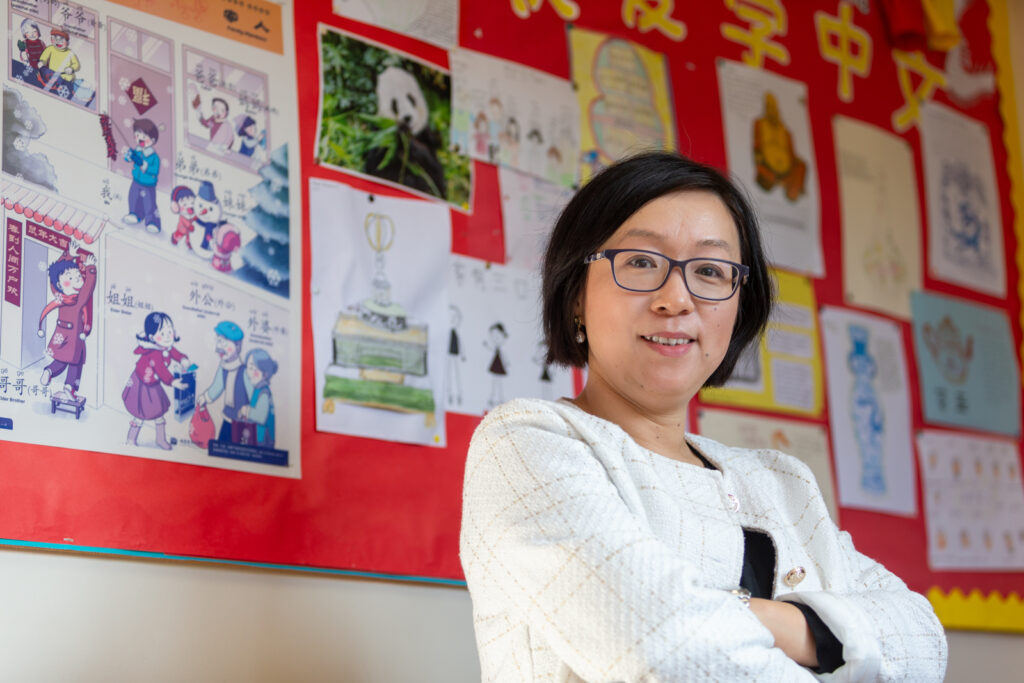Mandarin

All Modern Foreign Language teachers are committed to promoting excellence and to the great value of acquiring skills in foreign languages for students’ personal and academic development.
Mandarin Chinese is the world’s most prevalent language. Knowledge of this fascinating language will place our students one step ahead. According to the BBC, Mandarin – unlike English – uses both sides of the brain, as opposed to just one side. It is great for the development of cognitive faculties, therefore, and encourages students to think in new ways.
Students can choose to study Mandarin from Year 8 through to GCSE. The Mandarin Department is dedicated to creating a stimulating, demanding, and enjoyable setting where students can elevate their proficiency in reading, speaking, listening, and writing in Chinese characters to exceptional levels.
Our lessons also strive to cultivate a profound understanding of Chinese culture, history and modern society. Furthermore, students have the exciting opportunity to participate in a language and cultural immersion trip to China, which includes volunteering at the Dujiangyan Panda Research Centre.
Students can choose to study Mandarin from Year 8 through to GCSE and A Level (in future years to come). Embarking on the journey of learning Chinese unveils a captivating gateway to an extraordinary history, culture, and a vast reservoir of literature and art.
In Lower School, students acquire fundamental vocabulary, sentence structures and crucial character writing concepts, laying the foundation for their growth in listening, reading, writing, and speaking Mandarin. There is a strong focus on instilling effective study habits that empower students to become self-reliant learners.
The curriculum is crafted to nurture students’ intellectual curiosity and passion for the Mandarin language and Chinese culture. This is achieved through immersive experiences in cultural activities, educational trips, and engaging in national level competitions.
GCSE Mandarin aims to enable students to comprehend and communicate effectively in spoken and written Chinese. The curriculum also encompasses an exploration of Chinese culture and everyday life in China, as well as other Chinese-speaking countries and communities.
Additionally, the course emphasises the development of independent learning skills and the discovery of effective language learning strategies.
Students are expected to understand and provide information and opinions about these themes relating to their own experiences and those of other people, including people in countries or communities where Chinese is spoken.
Our enriched learning opportunities in GCSE Mandarin encompass a China cultural trip, participation in the British Council National Mandarin Speaking Competition, involvement in the Chinese culture club, and access to additional teacher surgeries for extra support.
Meet the Head of Department
Mrs Liu’s love of languages began at the age of 10 when her English teacher in China commended her efforts in learning the language. Years later, she graduated with a first-class degree in English Language and Literature from Beijing Language and Culture University. She came to the University of Birmingham to do her Masters, and later gained a PGCE from University of Warwick.
She brings an unwavering passion for language learning and a profound commitment to the holistic development of her students inside and outside of the classroom, fostering a deep appreciation for Chinese language and culture, and making learning Mandarin an exciting journey of discovery. Apart from teaching, she is also a Principal Examiner at Cambridge International Assessment for A Level Mandarin.

Future Careers
The DfE says: “Learning Mandarin has the opportunity to open up a wealth of opportunities to students, and it is the most widely spoken first language in the world, given China’s huge strategic importance to the UK and the importance of education in developing that wider relationship.’’
While English is widely spoken in many other countries of the world such as India, and those of the European Union, this is not the case in China. Being able to collaborate and communicate with Chinese people, in all fields – from engineering and science, through to law, business and politics – will give you the edge when it comes to moving your career, and perhaps the world, forward in the future.
Students can choose to continue studying Chinese language and culture at university level or pursue a complementary subject such as international business, international relations, economics, law, politics, psychology, education, art and journalism.
Beyond the classroom
The Mandarin Department offers the following programme of co-curricular activities:
Lower school
- Attend a study and cultural trip to China, volunteering in a panda research centre
- Attend a specialist workshop during Chinese New Year celebration
- Take part in Chinese and Far East Culture Club
- Take part ina translation competition run by The Queen’s College, Oxford University.
GCSE
- Apart from the above, have additional support lessons with their teachers outside the classroom
- Help to run Culture Club
- Attend guest speakers’ talks in school
- Visit the Faculty of Asian and Middle Eastern Studies at the University of Cambridge.






